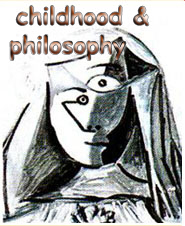natureza dá e natureza leva: uma comparação qualitativa entre crianças canadenses e alemãs sobre seus conceitos de "natureza"
DOI:
https://doi.org/10.12957/childphilo.2018.30037Palavras-chave:
filosofia para crianças, filosofia da natureza, meio ambiente, comparação alemã-canadenseResumo
Com as preocupações acerca da passagem da Terra por uma transição ambiental se tor-nando mais proeminentes, este artigo pretende introduzir um estudo piloto que busca investigar as ideias comuns que as crianças têm a respeito da natureza, e o modo como tais ideias emergem no contexto de uma comunidade de investigação filosófica. Estamos particularmente interessados em uma comparação cultural entre crianças alemãs e cana-denses, de modo a notar se as diferenças culturais exercem influência sobre o modo como as crianças entendem e se sentem a respeito da natureza. Este estudo piloto contribui a um melhor entendimento das diferenças culturais que subjazem a percepção da natureza pe-las crianças. O propósito deste estudo é de investigar como, desde uma idade tenra, as crianças formam uma relação com a natureza, assim como o efeito que a natureza pode ter nas relações das crianças consigo mesmas, com os outros, e com seu ambiente. Além disso, o processo de investigação filosófica pode fornecer sensibilização à como as crianças refletem e sentem-se, conforme crescem dentro da atual cultura focada na sustentabilida-de ambiental e desenvolvimento econômico. Apesar do fato de pesquisas anteriores terem explorado a conceptualização infantil da natureza, uma abordagem qualitativa através do paradigma da Filosofia para Crianças ainda não foi implementado antes do presente estu-do. Este estudo foca em 16 crianças canadenses com idades entre 9 e 13 anos e 12 crianças alemãs com idades entre 7 e 15 anos, para ilustrar como específicas noções pré-concebidas de natureza podem moldar nossa individualidade e nossa conexão com relacionamentos humanos e ecológicos mais amplos.Downloads
Não há dados estatísticos.
Downloads
Publicado
2018-05-07
Como Citar
ASLANIMEHR, Parmis; MARSAL, Eva; WEBER, Barbara; KNAPP, Fabian. natureza dá e natureza leva: uma comparação qualitativa entre crianças canadenses e alemãs sobre seus conceitos de "natureza". childhood & philosophy, Rio de Janeiro, v. 14, n. 30, p. 483–515, 2018. DOI: 10.12957/childphilo.2018.30037. Disponível em: https://www.e-publicacoes.uerj.br/childhood/article/view/30037. Acesso em: 9 maio. 2025.
Edição
Seção
artigos




